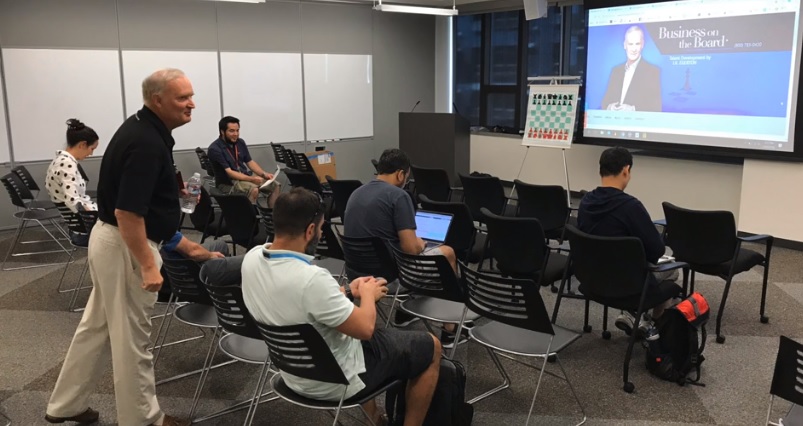Five Questions with James Egerton, ’76, of Business on the Board®
By Eva Richards
Checkmate! NIU alumni James Egerton has created an entire business philosophy based on the strategies behind excellent chess play. Through his Chicago-based corporate training program Business on the Board®, Egerton has been training teams at some of the largest companies in the country like Amazon, FedEx, Wrigley Company, and RR Donnelley, helping them identify their best business moves .
Q: Chess players are competitive. What’s been your relationship with chess over the years?
A: I was always competitive in things I found challenging, even as a kid. I wanted to get good grades in school, and I played all the sports I could. I discovered chess in high school and played my first rated tournament in 1971. Since then, I’ve played in the National Open and twelve U.S. Open Chess tournaments. I have a master’s rating in postal chess and some of my games are published on the mega-databases on the Internet. When I earned my M.B.A. in Finance in the early nineties, I didn’t have time to play in tournaments anymore. When my oldest son became interested in chess I started teaching at his school chess club in the evenings, and I began to see how transformative it can be for people.
Q: Where did the idea for Business on the Board® come from?
A: After graduating from NIU, I started out as a math teacher, but veered off that track early on and became an IT and HR executive. Through the last two decades, I’ve taught children chess in schools, libraries and park districts through my company Chess-Now, which evolved into more corporate talent development when I published my best-selling book Business on the Board: How the World's Greatest Game Can Build Better Leaders.
The idea came from my 24 years of experience in business, my M.B.A. training, my chess mastery and a desire to teach. It’s been said that business is a game, and when I looked back on my career, I saw many parallels between playing chess and running a business. When I look back on my executive career, at one point I had fourteen people reporting to me. I didn’t do it consciously but I did use lots of strategies from chess to run my department. For instance, my department supported 32 corporate computer systems so I used the chess principle of “overprotection” by having a lead and a back-up on each of the systems.
Q: Chess and business may not seem like an obvious pairing to some. But why does this method work do well?
A: Games are fun, especially when you win. We all grew up playing games, and there is something about the mental challenge of playing chess that sets it apart from other games. There is no luck. It’s all skill and strategy. I’ve seen that business leaders can improve their performance by not relying on luck and strategically looking at where they want their business to go. Studies are showing chess improves performance in school, in athletics and in business, and many companies have modified the way they train employees into game-based content because of this.
Q: What can attendees hope to get from your upcoming workshop “Building Better Leaders” coming up in Chicago on Oct. 21?
A: Through chess play, they’ll learn critical leadership skills like delegating, evaluating, eliminating, managing risk and making a profit. The workshop is targeted to HR decision-makers responsible for developing the talent in their organization, but it’s also for individuals or entrepreneurs who want to have a place to practice their strategic thinking and decision-making. What I do is unique, and clients love it because it is hands-on and has a built-in fun factor. I don’t use chess to compete; I use it as a tool to improve the thinking and decision-making of my clients.
Q: What have you taken with you from your time at NIU?
A: I graduated from Northern , and have always been involved in teaching or corporate training. I currently teach chess in several grade schools and love working with the little ones. I have seen chess literally change the lives of the kids I work with. NIU helped me to learn the skills I needed to teach, and it also taught me that what you get in life directly corresponds to the work you put in.
Register now for Business on the Board’s upcoming workshop on Oct. 21.
